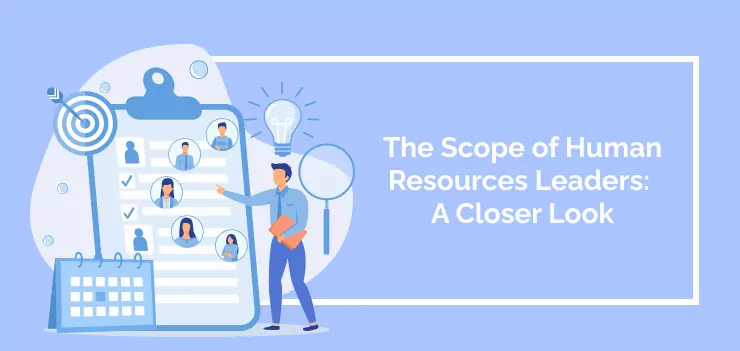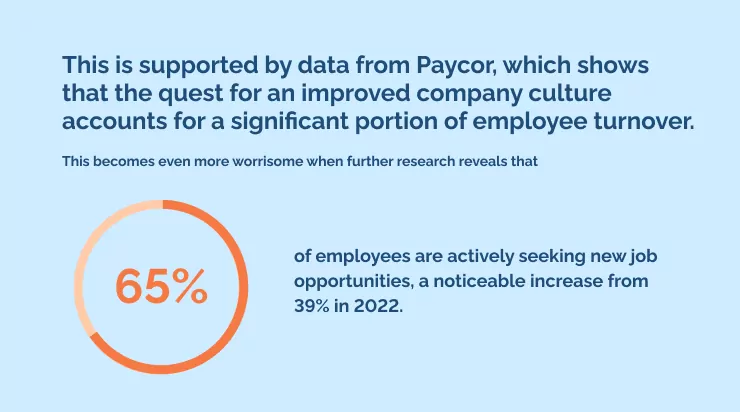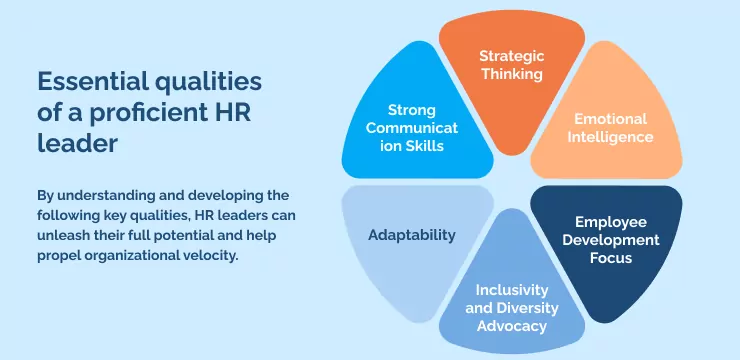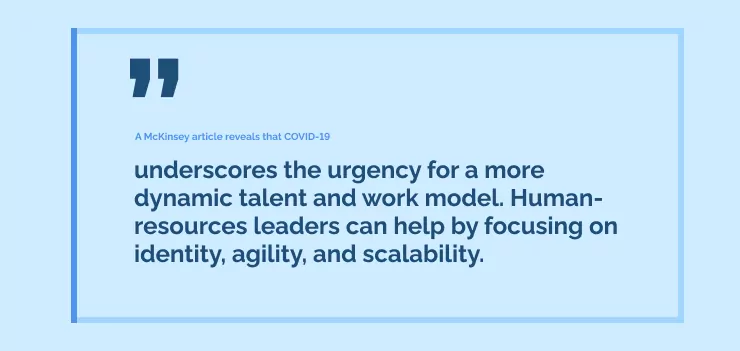
Where profitability, innovation, and agility typically serve as indicators of business success, a healthy company culture is a pivotal ingredient often overlooked for its contributions to driving business efficacy.
This is supported by data from Paycor, which shows that the quest for an improved company culture accounts for a significant portion of employee turnover. This becomes even more worrisome when further research reveals that 65% of employees are actively seeking new job opportunities, a noticeable increase from 39% in 2022.

Without a robust foundation that facilitates company culture, creating value through an empowered workforce becomes increasingly challenging.
HR leaders sit at the helm of shaping and nurturing this foundation, driving organizational transformation and employee development by fostering a thriving company culture and implementing effective people processes that inspire, engage, and empower employees.
In this article, we delve into HR leadership. We will first define who HR leaders are, identify their pivotal leadership roles, and then explore their value to businesses. We’ll also share the critical qualities HR leaders require for success and finish by providing concrete examples of HR leaders positively impacting their respective organizations.
What are Human Resources leaders?
Human Resources (HR) leaders hold key positions in an organization’s HR department, managing and overseeing all aspects of the workforce. These professionals play a crucial role in ensuring the success and growth of a company by developing and implementing effective HR strategies, policies, and practices.
Some of the primary responsibilities of HR leaders include:
- Strategic Planning and Execution: HR leaders align HR strategies with the organization’s wider business objectives. HR leaders actively engage with senior management to create well-rounded, visionary plans that elevate the company’s prospects and promote a culture of innovation, adaptability, and enduring success.
This involves anticipating future workforce needs, evaluating the effectiveness of current HR initiatives, and adjusting strategies as needed to drive continuous improvement. McKinsey research shows that 90% of CHROs at several prominent organizations in the United States and Europe foresee considerable shifts within the HR operating model over the next two to three years.
- Leadership and Team Management: As the head of the HR department, HR leaders are responsible for guiding, mentoring, and managing their teams. They ensure that HR professionals under their supervision have the necessary skills, resources, and support to carry out their duties effectively. Moreover, HR leaders cultivate a departmental atmosphere that values collaboration, fosters creativity, and supports professional growth and knowledge expansion.
- Organizational Culture and Employee Engagement: HR leaders play a pivotal role in shaping and sustaining a positive corporate culture. They work closely with senior management to define and communicate the company’s core values, fostering a sense of shared purpose among employees. HR leaders also develop and implement initiatives to enhance employee engagement, satisfaction, and retention, ultimately contributing to the overall success and growth of the organization.
According to the SHRM Global Culture Research 2022 Report, when asked to evaluate their organization’s culture, 72% of employees rated it as good or very good, and 20% considered it average. A mere 7% viewed their workplace culture as poor or very poor.
What are the key HR leadership roles and positions?
It’s essential to comprehend the varied roles that contribute to an organization’s success when navigating the realm of HR. The following section delves into key HR positions, highlighting their distinct responsibilities in propelling organizational growth.
- Chief Human Resources Officer (CHRO): The CHRO is the highest-ranking HR executive responsible for developing and implementing HR strategies aligning with the organization’s objectives.
- Vice President of Human Resources (VP HR): A senior HR leader who collaborates with the CHRO to manage the HR department and ensures the effective execution of human resources policies and practices.
- Chief Collaboration Officer (CCO): This role focuses on cultivating a collaborative work environment, fostering strong relationships among employees, and promoting a culture of teamwork and open communication.
- HR Manager: Manages the day-to-day operations of the HR department, oversees the implementation of HR policies and procedures, and ensures compliance with labor laws.
- Director of Employee Experience: Responsible for developing and implementing initiatives that increase employee satisfaction, motivation, and commitment to the organization.
- Chief People Operations Officer: Oversees all aspects of human resources, including talent management, performance management, employee engagement, and organizational development, to support the company’s growth and success.
- Chief Culture Officer: Focuses on shaping the organization’s culture by aligning it with business goals, promoting core values, and fostering an inclusive and diverse work environment.
The value of HR leaders in businesses
Leaders are indeed the backbone of any successful organization. Their strategic insight, deep understanding of human capital, and ability to adapt to constant change make them indispensable in driving growth and business speed.
Gartner reports that in 2023, leader and manager effectiveness will be the number one priority for 60% of HR leaders.
HR leaders possess a unique perspective on organizational dynamics, enabling them to identify talent gaps, foresee potential challenges, and craft innovative solutions. They act as the architects of company culture, skillfully weaving together the threads of employee satisfaction, engagement, and performance to create a harmonious and productive work environment.
One of HR leaders’ most significant contributions to a business is their ability to drive change. HR leaders navigate these transitions in an era marked by rapid digital transformation and shifting market demands. By anticipating the skills required for future success and implementing targeted training programs, they ensure employees remain agile and adaptable in the face of change.
In other areas, HR leaders excel at fostering a diverse and inclusive workplace, recognizing that a wide range of perspectives and experiences fuels innovation and creativity. They champion policies that promote equal opportunities, enabling businesses to tap into the full potential of their workforce.
McKinsey reports that the global market for diversity, equity, and inclusion (DEI) efforts, including employee resource groups, is expected to double to $15.4 billion by 2026. However, the current rate of progress indicates it will take 151 years to close the global economic gender gap at all levels.
In compliance and risk management, HR leaders are the organization’s first line of defense. Their expertise in labor laws and industry regulations allows them to develop and enforce policies that protect the company and its employees, ultimately safeguarding the organization’s reputation and bottom line.
Essential qualities of a proficient HR leader

HR leaders possess a unique combination of attributes that empower them to address complex workplace challenges and cultivate a thriving, inclusive environment.
A McKinsey article reveals that COVID-19 “underscores the urgency for a more dynamic talent and work model. Human-resources leaders can help by focusing on identity, agility, and scalability.”

By understanding and developing the following key qualities, HR leaders can unleash their full potential and help propel organizational velocity.
- Strong Communication Skills: The ability to convey information clearly and concisely, both in writing and verbally, is essential for an HR leader. Effective communication helps to avoid misunderstandings, resolve conflicts, and facilitate teamwork.
- Strategic Thinking: A proficient HR leader possesses the ability to think strategically, aligning HR initiatives with broader organizational goals. This involves anticipating trends, identifying growth opportunities, and developing long-term plans.
- Emotional Intelligence: HR leaders with high emotional intelligence can effectively manage their own emotions and empathize with others, which is crucial for building strong relationships, resolving conflicts, and fostering a positive work environment.
- Adaptability: In today’s rapidly evolving business landscape, adaptability is key. HR leaders must easily navigate change, quickly adjust to new situations, and implement innovative solutions when needed.
- Employee Development Focus: An effective HR leader recognizes the importance of investing in employee development, providing opportunities for growth and learning. By nurturing talent, they contribute to the overall success of the organization.
- Inclusivity and Diversity Advocacy: HR leaders must be committed to promoting diversity and inclusivity within the workplace. They should implement policies and practices that support a diverse workforce, ensuring equal opportunities for all employees.
Examples of HR leaders in action
Having effective and visionary leaders within the HR sphere is crucial for organizations to adapt and thrive. These HR pioneers shape the industry, inspire others to embrace change, and foster inclusive work cultures.
The following examples of HR leaders in action showcase their influence, achievements, and dedication to advancing the field. Their expertise, commitment to innovation, and unique perspectives have earned them notable praise.
Let’s look at these HR thought leaders and their impact on the HR arena.
Dave Ulrich is the Rensis Likert Professor at the Ross School of Business, University of Michigan, and a partner at The RBL Group. As a renowned HR thought leader, Ulrich has authored over 30 books and 200 articles on HR management and leadership. He has been recognized multiple times as the “#1 Management Educator & Guru” by BusinessWeek and as one of the top HR influencers by HR Magazine.
Vernā Myers serves as the Vice President of Inclusion Strategy at Netflix, leading the company’s diversity and inclusion efforts. Myers is a Harvard-educated attorney with a wealth of experience spanning over 25 years. She is an accomplished author, speaker, and consultant with more than two decades of experience in diversity and inclusion. She has been recognized for transforming workplace culture and creating inclusive environments.
Meghan M. Biro is the Founder and CEO of TalentCulture, a leading HR and talent management consulting firm. She is an influential HR strategist, author, and speaker, specializing in talent acquisition, employee engagement, and workplace culture. Biro has been featured in various media outlets, including Forbes, Huffington Post, and Entrepreneur, and has worked with numerous Fortune 500 companies.
Biro also leads the vibrant #WorkTrends Podcast and Twitter Chat, fostering engagement and discourse with top HR leaders and practitioners while dissecting insightful industry topics.
Josh Bersin is the Founder and Principal of Bersin & Associates, now known as Bersin by Deloitte, a leading provider of research-based HR, talent, and learning solutions. Bersin is regarded as the gold standard among over half of the Fortune 500 companies, solidifying his position as a worldwide leading HR and workplace industry analyst. His expertise and in-depth understanding of the field have earned him widespread recognition, making him an invaluable resource for organizations seeking to excel in HR and workplace management strategies.
Claude Silver is the Chief Heart Officer (CHRO) at VaynerMedia, responsible for fostering an environment that values empathy, connection, and belonging. Silver has over 20 years of experience in leadership, coaching, and team-building across various industries. She is known for her unique approach to HR, focusing on creating a culture where employees feel heard, valued, and empowered.
HR Leaders: Embracing Innovation and Evolving Work Trends
HR leaders are crucial in embracing innovation and evolving work practices in an era of rapid technological advancements and shifting work trends.
According to industry trends, HR’s predominant theme will center on employee-centricity in 2023. In addition, HR leaders will continue to address challenges such as reimagining work models, addressing the growing skills gap, labor market pressures, and the emergence of AI, machine learning, and other nascent technologies.
To assume a future-ready state, HR leaders must be agile, innovative, and forward-thinking in addressing the workforce’s numerous challenges.
By anticipating and responding to these challenges while maintaining a strong focus on employee well-being and engagement, HR leaders can create a work environment that attracts and retains top talent while sustaining productivity and innovation.
WalkMe Team
WalkMe spearheaded the Digital Adoption Platform (DAP) for associations to use the maximum capacity of their advanced resources. Utilizing man-made consciousness, AI, and context-oriented direction, WalkMe adds a powerful UI layer to raise the computerized proficiency, everything being equal.



